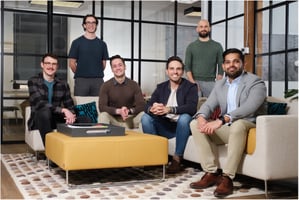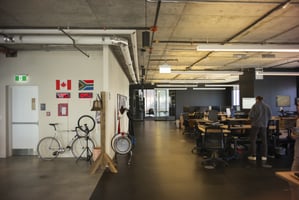Friday evening at Thin Air Labs. I stopped by to hang out with Ammar, COO and Co-Founder of Quickly...
Darcy Tuer, Founder & CEO, ZayZoon
I recently hit ZayZoon HQ to sit down with Darcy Tuer, Founder and CEO. Darcy and I got into what he's proud of, how his perspective of milestones and goals has shifted, and his motivation for taking care of himself.
Who is Darcy?
When I think about my identity, I became a founder in 2000, almost accidentally. It was seeing an opportunity to improve a process using technology. I was thinking why is this big company doing something so clunky when it could all be streamlined using a handheld device? A large part of my identity is accidentally becoming a founder and never looking back, and now it’s 7 companies later.

What do you think you’ve taken from each company to the next?
We underestimate the value of stacking lessons; you get this compounding effect on the accumulation of knowledge. Company number 1, when I look back it was that I found a way to improve a process using tech, but really it was monetizing my expertise. The lesson I learned was that I had a product I built and could sell. At the time I was thinking ‘These guys are willing to pay me an hourly rate to build the tech.’ and I thought it was the coolest thing. I built the team up and I would bill my hourly every month, but what I missed was that I had a product I could’ve sold myself. My aspirations were bigger than just billing my time out at an hour at a time.
What we learned was what if we took this product, raised some capital, and put that money towards what we called putting a cellophane wrap around the product. Meaning getting the product into a position where we could sell it to businesses repeatedly.
The first stacking lesson was that if you can build a product you can sell it multiple times; you can’t sell one-hour multiple times. That is how enterprise value is realized. You’ve now got an asset you can sell as many times as buyers are willing to pay. Then you learn of the economic value of solving the problem.
The next lesson was go-to-market strategy. I was way too focused on the product rather than getting the product in front of people we could help.
For me, as I’ve matured, financial gain isn't something personal pursuit anymore. It’s a pursuit of selling a company and having the financial and intellectual capital redeployed into the same ecosystem, in Calgary. They go start companies or work for scale-ups and increase the probability of success of the next. The arbiter of success for me as an entrepreneur is my kids going off to university and knowing that Calgary is as exciting as a place to work as Toronto or Montreal.
In a way, the pursuit for you is to be a catalyst of some sort.
I’ve always been a student of the happiness equation. When you have satisfied the need for food, shelter, and community; when you hit a certain income rate, I think what happens is once you’ve satisfied the economic outcome, then it becomes way more about impact. Impact by way of community or inspiration. I remember being inspired by Solium, and Benevity, these amazing companies that came before us to make the path just a little bit less risky for the ZayZoons and the Helcims.

How have your milestones, goals, or values shifted over the years?
It goes back to the question of who I am. My new goal is that I want to see myself as a builder. I grew up watching my dad take something from zero to one. I always admired the art, tenacity, and resourcefulness needed to build. I know I can start a business – there’s never a guarantee of success – but I want to be a builder of things that help the community. ZayZoon helps people financially, Aeon helps people's health, Tuesday gives people a non-alcoholic beer that tastes as good as a regular beer, and Portage helps with cleaner fuel. Everything I’m involved in has a purpose behind economics.
I think building things that benefit is a force multiplier. People like working for purpose-driven businesses. And when you have that exit, you’re now deploying purpose-driven people who have made mistakes and survived.
It’s similar to your first lesson in getting more value out of a single unit.
People used to call it a double bottom line. In that hour, you can sell a unit of value, and the consequence of that value is worth more than just our contribution to our revenue as a business. It’s another compounding factor in the value equation.
What is your motivation now when it comes to health and wellness?
How you live your life between 35 and 45, the decisions you make will determine the last 10 years of your life. If you take care of yourself in these years, your last 10 years could be going on walks with your grandkids, or going out to dinner with your spouse. The decisions you make after 45 are important, but the habits are set. I think there is a self-awareness that can happen when you're 35 where you think ‘Huh. My future self is subject to all the decisions I’ve made up until that point.’. And I want my last 10 years to be with my grandkids.
Health for me has nothing to do with work. It’s very egocentric, but not selfish. I’m better in all parts if I take care of my health. The things within my control, at least I’ll know I’ve controlled them.
If I look at happiness, a big part of that is experiential. Being able to do things with my kids. Every time I work out, it’s because I know I want to be able to ski with my grandkids.

Do you think that thought comes from seeing the result of putting in work now for later? Where does that mindset come from?
I think the most important skill to learn is delayed gratification. There’s something interesting about longevity and ties to being a founder. When you put yourself under stress, like working out, fasting, or cold plunge, our bodies are miracles at responding to stress in a very positive way. That’s building a company. You’re in the hurt locker, at the edge of your comfort zone. If you survive, you invariably come out stronger.
I do think you have to remember to create space for things that make you happy. That’s why you’re doing the hard stuff. Sometimes the addict in us can become obsessed with the work and the pain, but we have to protect ourselves from giving into that all the time.
My dad had a big job, but he had a rule of 5:30 dinner every night. I follow that too. There’s no such thing as not having time, it’s how you stack your priorities. In the grind of being a founder, you have to take the time to take care of all aspects of yourself.
I think House 831 is home to some of the most cathartic experiences you can have as a founder. Talking to other founders with the same experience, the same journey, and the empathy that runs between founders.
What are you proud of?
My business partner of 23 years, the other day said to me we’ve employed hundreds of people over the years. I’m most proud of being able to have an impact on the people who were willing to suspend disbelief and join a company I’ve been a part of. I’m proud of what those people take away. You don’t have to have a massive exit to have an impact. If I visualize the impact zone, I think it’s a significant impact. I don’t need to tie my name to it all, but I think to myself ‘Huh. I made a bit of a difference in a meaningful way.’.
Thank you, Darcy.


